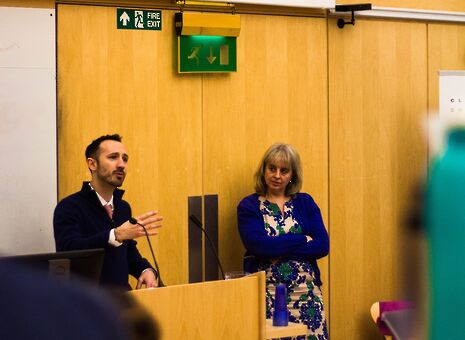‘Parliament has got to take back control’: CULS discusses Brexit
Professor Catherine Barnard and Dr Chris Bickerton talked about the reasons for and consequences of last year’s historic decision to leave the EU

On Thursday, Professor Catherine Barnard and Dr Chris Bickerton discussed the implications of Brexit in the Faculty of Law, in a debate hosted by the Cambridge University Law Society.
Barnard is a Professor of European Union Law and is a Senior Fellow of The UK in a Changing Europe, while Bickerton is a university lecturer in politics at the university’s Department of Politics and International Studies (POLIS), and is a Leave supporter.
Barnard structured most of her talk around the Leave campaign’s slogan, “Take back control”. She examined whether or not Britain truly was “taking back control” of law-making in Parliament by leaving the European Union, and evaluated the current state of parliamentary sovereignty.
She criticised a recent white paper’s statement that while Parliament had remained sovereign within the EU, it had not always “felt” sovereign, as inadequate justification for Brexit. To leave Europe on the basis of a “sentiment of lack of control”, Barnard argued, was “concerning”.
Since, Barnard argued, the UK is involved in over 14,000 international contracts, Brexit seemed like “a pigeon step” in “taking back control”.
As part of the process of leaving the EU, 20,833 EU laws and rules were to be scrutinised over the course of 500 days, amounting to 40 laws a day – “and these”, Barnard added, “are not straightforward laws.”
Barnard also drew attention to Theresa May’s speech on 1st October 2016, in which May noted the need for proper scrutiny of laws.
“So many things being done at EU level now need to done on a UK level,” said Barnard. “Despite aspirations for full scrutiny, Parliament does not have the time or the competence to do this, and so it will be done by secondary legislation.”
She spoke urgently of Parliament’s need to properly scrutinise the laws, in order “to give meaning to the term sovereignty.”
So far, she said, Brexit had meant, “taking back control not for [the] UK Parliament, but for the executive.”
“Parliament has got to take back control”, she asserted. “An overarching executive could be very dangerous for democracy.”
Bickerton looked at the implications of Brexit for the EU. Brexit, he argued, would reveal the EU’s flaws. However he also argued that it was unlikely the EU was heading for collapse, as the institution of the EU had resulted in a “fundamental process of state transformation” within countries that could not simply “change overnight”.
Bickerton claimed that discussion around Brexit has veered too much in the direction of the re-emergence of nationalism. “This is a comforting argument because it imposes a legible map onto the EU,” he said. But the the events of the past, when there were “imperial states with imperial rivalries”, and not nation-states, bore little relevance to the situation today.”
Another problem within the EU, Bickerton argued, is the “crisis of national authority across Europe”. He proposed that Brexit represented an “anti-establishment revolt”, and that the “old rules of politics” no longer function.
He referred to the rise of anti-establishment figures and outsiders, such as Marine le Pen, within French politics. “Because [the] EU has become increasingly reliant on government for its own legitimacy”, Bickerton said, “the rise of anti-establishment figures within politics reveals a fundamental fragility within the EU.”
In order to survive, he argued, the EU needs to find an alternative to figures like Le Pen. “If it doesn’t, over time it will shrink, wither and become irrelevant,” he said, “unless some other compelling version of the EU materialises.”
This article previously wrongly stated that Professor Barnard was a Remain supporter. It has since been corrected to reflect her impartiality
 News / Copycat don caught again19 April 2024
News / Copycat don caught again19 April 2024 Interviews / ‘People just walk away’: the sense of exclusion felt by foundation year students19 April 2024
Interviews / ‘People just walk away’: the sense of exclusion felt by foundation year students19 April 2024 News / AMES Faculty accused of ‘toxicity’ as dropout and transfer rates remain high 19 April 2024
News / AMES Faculty accused of ‘toxicity’ as dropout and transfer rates remain high 19 April 2024 Theatre / The closest Cambridge comes to a Drama degree 19 April 2024
Theatre / The closest Cambridge comes to a Drama degree 19 April 2024 News / Acting vice-chancellor paid £234,000 for nine month stint19 April 2024
News / Acting vice-chancellor paid £234,000 for nine month stint19 April 2024




